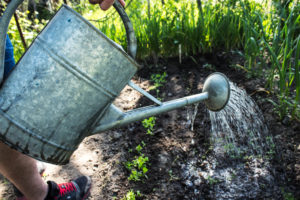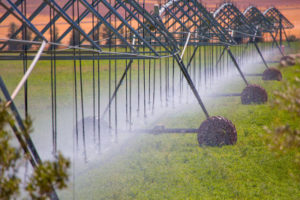
The best irrigation system can only work as well as the water allows. Whether for home garden irrigation, nurseries or agriculture, if the water is problematic, the irrigation system needs a lot of care to operate optimally. Relatively, there can be significant undesirable costs.
An irrigation system works quite simply. You need water, of course, a pump to deliver the water, a hose or hoses or piping. These supply sprinkler unit(s) that eventually irrigate the plants. Control can be done quite simply with a timer, for example. High-end systems measure the moisture in the soil and irrigate only when needed.
This works the same way for agricultural irrigation, as well as in your garden. Only the quantities, dimensions and machines are different.
Watering the Garden

The advantages are obvious. A heavy watering can, puts much more strain on the back than automatic irrigation. And the garden is watered even when you are not at home. However, automatic irrigation can only function optimally if all components work properly.
Irrigation in Agriculture

Along this arm are sprayers. These sprayers provide the actual irrigation. To achieve uniform irrigation, the flow rate at all sprayers should be the same. In order to make irrigation as precise as possible while wasting as little water as possible, sprinklers have become more and more sophisticated.
Another widely used method of irrigation is swing-arm sprinklers (photo above left). These sprinklers also irrigate from a central point. Such circular or part-circle sprinklers are also suitable for garden irrigation. With the large sprinklers, for agriculture or plants and stadiums, you can irrigate radii up to about 35 meters. The rotary movement is achieved by the oscillating lever. This oscillating lever is driven by the water.
Possible Issues with Irrigation or Watering
As we successfully provide water treatment technology we are facing questions from all over the world concerning limescale, corrosion or biofilm in the irrigation system. The root of these issues is the water supply and namely the water quality.
Hard water contains limescale and salts which can settle in pipes and especially in small valves or sprinklers. If the water itself contains iron, metallic pipes are harmed by corrosion. Plants develop a brown color, which is an indicator of iron in the water. Lately, biofilm or biomass is a current problem in farms and private irrigation systems. Once the system is contaminated with microbial growth, it constantly produces new biomass. The risk of blocked pipes in the whole system gets higher and higher. Where the irrigation is also used for fertilizers, the efficiency of the fertilizer can be affected negatively and it is difficult to estimate the right amount of fertilizers.
Often it is not an option for chemical treatment. The amount of water used is too high and the costs are unbearable – some farms in North America, we are working with, need more than 1000m3 a month. Decalcification can be very costly.
Reducing Limescale, Rust and Biofilm with Merus Rings
If chemical water treatment is not possible for economic or ecological reasons, physical water treatment can be an option. We are providing so-called Merus Rings which are a sustainable solution for problems around water systems. The trick is to keep foreign substances solved in the water. As long as they don’t settle but are flushed out of the system constantly – blocked pipes are not an issue anymore.
In private homes, where the house is equipped with the Merus Ring, usually, the water for the lawn and vegetable garden is included. In cases of a huge landscape or a garden with a well, a second Merus Ring is needed. It is installed at the main pipe.
At farms, the amount of Merus Rings needed for a sufficient result depends on the size of the landscape and the irrigation system. Often we install more than one Merus Ring to reach every hose, pipe, valve and finally plant.
